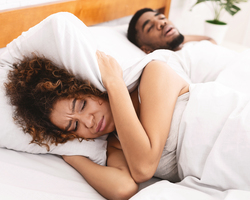
June 1, 2023—Getting a good night's sleep is a great feeling. But for many men, quality sleep is elusive. In fact, one large study reported that almost one-third of men in the U.S. got less than six hours of sleep a night.
If you regularly experience inadequate sleep or if you feel exhausted during the day, you might have a common disorder called sleep apnea.
What is sleep apnea?
Obstructive sleep apnea (OSA) happens when the tissue in the back of the throat collapses during sleep, preventing air from entering the lungs. As a result, you stop breathing temporarily and wake up. This can happen several times per night, which can make you feel like you've hardly slept at all.
A less-common form is central sleep apnea (CSA), in which the brain doesn't send regular signals to the diaphragm to expand and contract.
OSA can be mild or severe. Its main symptoms are feeling sleepy during the day and severe, loud snoring. However, not everyone who snores has OSA, and you may not even be aware that you snore.
Sleep apnea and men's health
Men are twice as likely as women to have OSA. OSA causes your body to release stress hormones. Eventually, says the American Heart Association, this can increase a man's risk for:
- Heart disease—the leading cause of death for men.
- High blood pressure.
- Stroke.
- Type 2 diabetes.
- Metabolic syndrome.
- Obesity.
- Fatigue and irritability.
A man's likelihood for OSA increases if he:
- Is overweight or obese.
- Has a thick neck, narrow throat, or enlarged tonsils or adenoids.
- Smokes.
- Drinks alcohol.
Diagnosis and treatment
If you think you have OSA, talk to your doctor. Your doctor may refer you to a sleep specialist for a sleep study. The study will tell you if you have sleep apnea and what type it is.
There are many treatments for sleep apnea.
A continuous positive airway pressure (CPAP) machine gently pushes air into your airway to keep it open while you sleep. It includes a mask that fits over your nose and mouth.
Oral appliances can help mild to moderate OSA. They keep your throat open during sleep.
Lifestyle changes complement other treatments. They include losing weight, avoiding alcohol or certain medications, quitting smoking, and sleeping on your side instead of your back.
Surgery on the tissues in the back of the throat can treat sleep apnea if other treatments don't work.
After treatment, your sleep specialist may want to do a follow-up sleep study to learn if your OSA has resolved.
Should you talk to your doctor about your sleep? Our sleep-study decision tool can help you decide what steps to take.
Sources
- American Academy of Sleep Medicine. "How Sleep Disorders Affect Men's Health." https://sleepeducation.org/how-sleep-disorders-affect-mens-health/.
- American Academy of Sleep Medicine. "What Sleep Disorders Affect Men?" https://sleepeducation.org/what-sleep-disorders-affect-men/.
- American Heart Association. "What You Need to Know About How Sleep Apnea Affects Your Heart." https://www.heart.org/en/health-topics/sleep-disorders/sleep-apnea-and-heart-disease-stroke.
- Chest Foundation. "Obstructive Sleep Apnea (OSA)." https://foundation.chestnet.org/lung-health-a-z/obstructive-sleep-apnea-osa/.